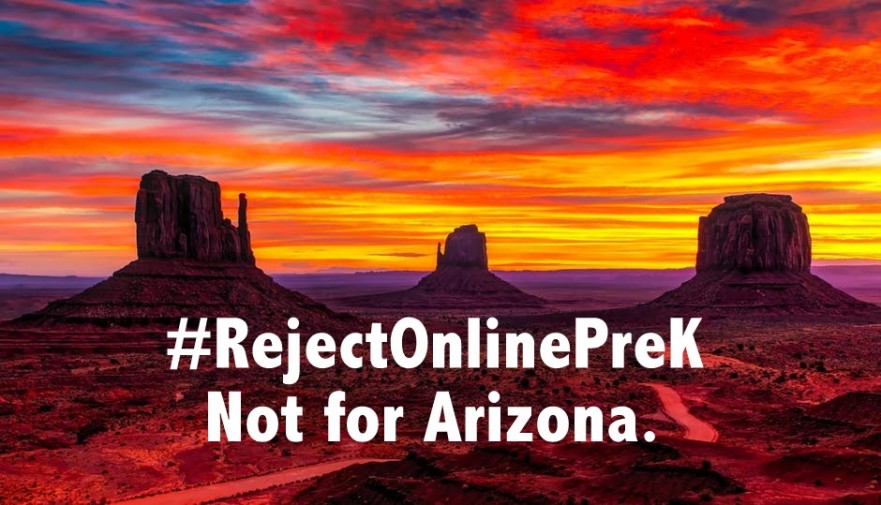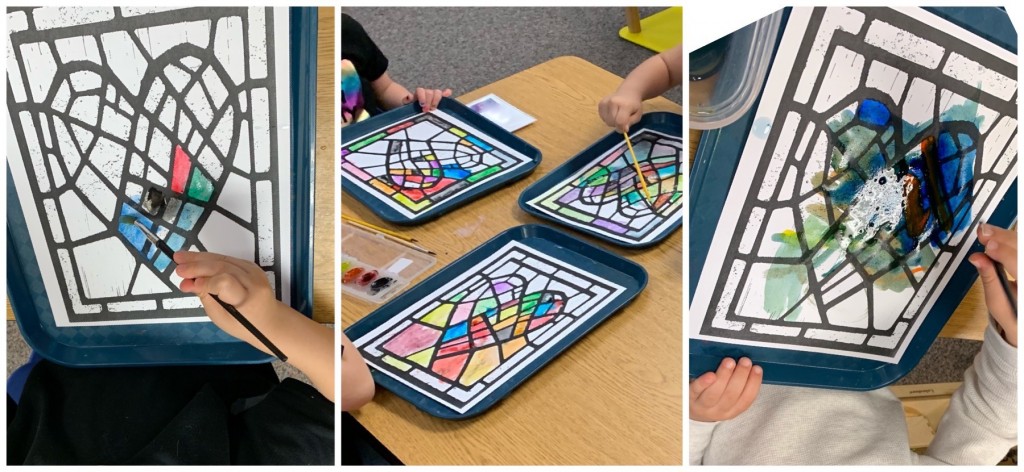This is a story about good intentions, bad implementation, and ugly consequences. But let’s get straight to the point: I’m talking about online preschool. Perhaps you just lowered your eyebrows and scrunched your face a bit. That’s what I did last month when I heard the Arizona House of Representatives was considering HB2518, a bill that would have allocated $500,000 to online preschool for Arizona four-year-olds. Thankfully, it met a quick end in this legislative session. I want to strongly urge our legislature not to reconsider this idea in the future. Online preschool lacks the authentic learning in real preschool classrooms and disregards the needs of early learners. Instead, we must invest in quality early childhood environments for all Arizona children.
When I told my husband I was writing a piece about online preschool, he said, “I don’t know who would be in favor of online preschools except for the people who run them.” Wise words. The online preK market includes for profit companies and recent growth in the nonprofit sector, beginning with Utah’s UPSTART program in 2015. Proponents say online preschool can increase student access and decrease cost. I say it’s a dangerous imposter at a crucial time in a child’s life. According to the UPSTART website, there are pilot programs running in seven other states and they are “always looking for new ways to grow UPSTART.” Early childhood professionals, it’s high noon and there’s a new outlaw riding into town. Time to gather together, prepare for a fight, and be the sheriff our kids need.
As an early childhood teacher, I am highly concerned that online preschool is being advertised to parents, legislators, and community members as a preschool experience. It’s misleading to pretend that a few minutes of screen-time drilling letters and numbers could replace a child’s opportunity to participate in a learning community, interact with peers, form relationships with teachers, and develop self-regulation skills. Other educators share my concern. In October 2018, Defending the Early Years and the Campaign for a Commercial-Free Childhood co-authored a well-researched, concisely worded statement against online preschool, signed by more than 140 education leaders and organizations. Further, there is an excellent piece written by Nancy Carlsson-Paige that explores the benefits of in-person preschool, explains the risks of online preschool, and suggests that online preschool environments will widen achievement gaps and increase inequality. I highly recommend reading both of these resources. To further the dialogue, I want to share a few stories (with altered names) from my own classroom to showcase the importance of REAL preschool with real kids, real books, and real art.
Real kids. What kind of price tag can you put on real friendships? The sheer act of learning how to make a friend and keep him is priceless for young kids. I think social-emotional learning is highly valuable in a preschool classroom, and I’ve written about how I use a restorative justice model for classroom management. We emphasize kindness in my classroom, and I’ve witnessed some beautiful moments between kids. Last week, my students were working on a space collage. James pushed his yellow rocketship sticker aside and pointed to a green rocketship that was already stuck to Eddie’s paper. I suggested James could ask Eddie to trade. James made a couple convincing arguments while Eddie shook his head vehemently no. A few minutes later, I noticed that James had a green rocketship on his paper. More surprising, Eddie had a yellow rocketship on his paper. “Eddie, did you decide to trade with James?” I asked. Eddie beamed with pride. James was beaming, too. I continued, “Look at his happy face! Your kindness made him so happy!” James added, “Yeah, I’m so HAPPY Eddie!” It was a proud moment for them both. A few minutes later, I noticed that James was giving some stickers to another student. I praised James, “How kind that you are sharing with a friend!” And here was his beautiful response: “Yeah, because I was so happy that Eddie shared with me that I wanted to share, too!” All three of the kids sat there beaming at each other. Seriously? What a powerful learning moment. I think moments like this are lessons for life. You just can’t teach this stuff online.
Real books. A few years ago, I started scanning books to show on my SmartBoard while I read them aloud. There are so many potential benefits: The kids can see the pictures, I have my hands free to act out the story, and I can show how to track words with my finger. Best idea ever? That hasn’t been my experience. Most of the time, the kids haven’t really seemed to care. I’ve chalked this up to many things: Wrong day, wrong book, wrong outfit (hard to know what affects preschoolers sometimes!) One day, they were totally disengaged and goofing off during a book I was expecting them to love. What was going on here? The previous day, they were mesmerized while I read a book. What was different? Lightbulb! The previous day, I read from a REAL book in a traditional style. So I clicked off the SmartBoard and picked up the real book instead. Their little eyes locked in on me and they became mesmerized by the great story, just as I had anticipated. What a learning moment for me. I’ve thought a lot about this since then and here is what I think: Kids get so much exposure to screens that they have become desensitized and disinterested in them. Their brains have learned to automatically check out. More than ever, preschool kids need real life interactions to engage and make meaningful connections. Online preschool just exacerbates a problem that is already out of control.
Real art. I firmly believe that preschool students should have real art experiences with quality materials. Art provides an opportunity to practice motor skills, active engagement, and experimentation. How could an online preschool program offer quality art experiences? I want to share some recent photos of my class for those who aren’t familiar with preschool art. In the first photo collage, my students are deeply engaged learning about watercolors. The hands pictured on the left and right side belong to two students who struggle most with attention. Experiences like these captivate all kinds of learners! Seeing these two students engaged with such rapt attention was a big highlight for me!
The second photo collage includes a series of recent art projects. The first is a castle that my students built during a Project Based Learning unit. The kids cooperated to determine an idea, draw and plan, and build together. This project took them two weeks and they used the castle to play together in dramatic play for an additional two weeks. It offered them authentic problem-solving opportunities and the satisfaction of quality work. The second photo was an artistic response to the book Ocean Meets Sky. The kids painted on foil to create unique art and decorated with fish and star stickers. We celebrated their work by creating an art gallery in our classroom. The third photo is a science art project where the kids dropped colored vinegar onto salt. You can see how they are working together and sharing the space. If only you could hear them talking about their learning! These moments are priceless. Quality art opportunities should be a staple of any early childhood environment. How can opportunities like these happen on a computer screen?
If online preschool creeps into my neck of the woods, I’ll be ready for a showdown. Join me in advocating for quality early childhood experiences in Arizona and across the United States. You can use the hashtag #RejectOnlinePreK, coined by Defending the Early Years. Check out their website for some sample social media posts, and use your own social media to showcase the important learning in your own classroom. Let’s send online preschool riding off into the Arizona sunset, never to be seen again.
Want to read more opposition? Check out other articles here and here.












Comments 1
I teach high school and see students leaving and returning from online school all the time. It takes an incredibly self-motivated student to be able to handle the self-pacing, schedule setting, and academic skills to do well online, and most of our students use online classes to supplement their schedule with a class or too, not a full day online. I can’t imagine how detrimental online preschool could be for our students who need the most hands-on, collaborative interactions. Your husband’s comment about only those running them could think this was a good idea is so spot on.